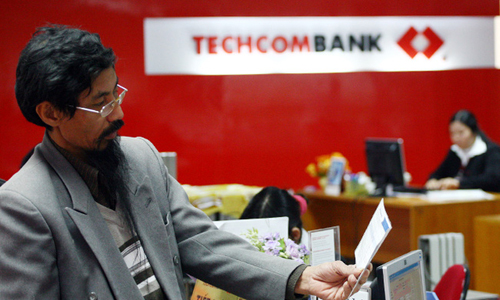After separating from HSBC, Techcombank plans to spare no room for foreign investors, and VP Bank, which has been prospering in the last four years, is no longer eager to seek foreign partners.
Under the current law, foreign investors can hold up to a 30 percent stake in one Vietnamese bank. However, Techcombank is collecting shareholders’ opinions about cutting the foreign ownership ratio limit in the bank to zero percent.
| Under the current law, foreign investors can hold up to a 30 percent stake in one Vietnamese bank. |
Several years ago, analysts commented that VP Bank might regret OCBC withdrawing its investment capital. However, the absence of foreign investors at the bank has in no way affected the bank’s performance. The bank has been witnessing profit growth at ‘lightening speed’ in the last four years.
VP Bank’s CEO Nguyen Duc Vinh said he doesn’t think the presence of foreign strategic investors is a must for Vietnamese banks to gain success.
“There are many ways to reach one goal and if you can choose reasonable strategies, you will succeed, no matter if there is a foreign strategic investor,” Vinh said.
“Instead of choosing the strategic partners who may share the same view with VP Bank, we choose foreign experience,” he said, adding that half of the members of board of management are foreigners.
The ‘reasonable strategy’ that Vinh mentioned for VP Bank is the focus on retail banking. The bank has been targeting small and medium enterprises, micro enterprises and business households, pushing up lending to clients via its FE Credit, called the ‘goose that lays golden eggs’ for VP Bank.
Analysts commented that in most cases, foreign investors only see Vietnamese banks as an item of their investment portfolios and they may restructure investment portfolios at any time.
The ‘marriage’ between VIB and Commonwealth Bank of Australia (CBA) is one of very few long-term cooperation deals.
The UK-based Standard Chartered said at the 2017 ACB’s shareholders’ meeting held earlier this year that it will divest from ACB.
An analyst commented that he doesn’t think Techcombank will reject foreign investors forever, but said the move by Techcombank shows Vietnamese banks are no longer eager for foreign investors.
In the past, Vietnamese banks once rushed to look for foreign investors because they thought foreign capital and foreign technology would help them grow. But now, they tend to be more cautious when planning cooperation with foreigners.
The biggest problem of foreign strategic investors is that they only consider Vietnam for short-term investment deals, so they don’t bring the best they have to Vietnam.
“They are big partners who do business globally, so they may not attach much importance to investments in Vietnamese banks,” Vinh commented.
Kim Chi / vietnamnet